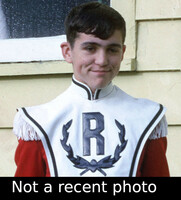Rhythm Syllables
Category: Music, Piano PerformanceDate: 2006-03-29
While working at jazz pieces and some Stephen Heller exercises that have sextuplets (six note patterns in one beat). I needed to add to my counting vocabulary. My earlier training engrained syllables for a few patterns:
eighths: (one-and two-and ... ) eighth triplets (one-trip-let two-trip-let ... ) sixteenths (one-e-and-a two-e-and-a ... ) quarter triplets (over two beats) (one-o-let three-o-let)
The above paradigm provided a specific syllable for each positional timing, and insisted that the first syllable of a pattern be the beat number in the measure. When patterns became more complex you would leave out the unplayed counts. All of this didn't really help me when getting to the new pattern of sextuplets (e.g. in the patterns of McPartland shown in an earlier post).
Internet research shows that piano educators are in no particular agreement on what's best, so I came up with something that works for me from the various schools of thought. What I like are pronounceable syllables that roll off the tounge with appropriate syllable emphasis. So for a six syllable word to aid in counting the sextuplets, I use:- rump-i-ty-hump-i-ty
This "word" places appropriate emphasis on the first and fourth syllables, which helps to keep the note pattern flowing properly. Because "rump" is different than "hump", the word helps to reinforce where I am in the measure when learning long runs of sextuplets. I also find that hump is naturally stressed somewhat less than rump in the pronounciation of this word. That effect is also appropriate to the playing of sextuplets.
While researching this, I found one simple phrase that is quite helpful with triplet patterns. I tend to rush them! The following is interesting:- stuck-in-gum
When used as an aid to counting a triplet pattern among straight eighths or quarter note patterns, it helps me to avoid the rush just because the image of "stuck in gum" slows a guy down a tad. Funny how the mind works!
This week's challenge is to learn a septuplet (seven note pattern) among a bunch of sextuplets. In this piece, I'm moving along with a bunch of rumpity-humpities, and now I have to deal with a ??-???-???-??-??-???-??? What is the aid I use?
What I came up with is:- noodle-ee-bee-doodle-ee
It rolls off the tounge and places light emphasis on the final syllable. In addition, it focuses the mind on the symmetry of the pattern. (A seven note pattern has middle element --"bee".) So I know that if I'm playing eighths in the left hand with noodle-ee-bee-doodle-ees in the right hand then the second eighth falls after the bee but before the doodle! I started out toying with noodle-ee-doodle-ee-doo, for septuplets, but that word has a problem! It places a strong emphasis on the last syllable, and I soon found that noodle-ee-doodle-ee was just another pronounciation of rumpity humpity, so it was counter productive. With this pronounciation it was easy to confuse the six note pattern with the seven. The word I chose, noodle-ee-bee-doodle-ee, is suitably distinct as a seven note pattern.
I'm learning to talk "New Yorker". So to use my favorite New York slang: How weird is that?
Here's some links to material I used in forming my thoughts on the subject.
- Counting Mnemonics
- Counting Mnemonics: Rumpity Tumpity
- Let's Take the Nonsense (Syllables) Out of Rhythm Teaching
2025 2024 2023 2022 2021 2020 2019 2018 2017 2016 2015 2014 2013 2012 2011 2010 2009 2008 2007 2006 2005 2004
Comments
I welcome your comments. You do NOT need to sign in to leave a comment. If you create an account and sign in, my comment system will notify you of replies to your comment. Thanks for stopping by.--Duane McGuire

